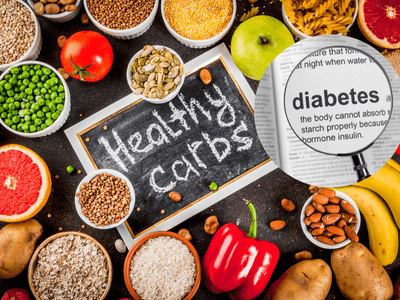Carbohydrates often get a bad reputation when it comes to diabetes management, but not all carbs are created equal. The key is choosing nutrient-dense, high-fiber carbohydrates that have a minimal impact on blood sugar. These healthy carbs provide essential vitamins, minerals, and sustained energy without causing harmful spikes in glucose levels. Below are eight healthy carbohydrate options for people with type 2 diabetes.
1. Quinoa
Quinoa is a nutrient-dense whole grain that provides sustained energy without causing blood sugar spikes. Its high fiber content helps slow digestion, promoting better blood sugar control. The protein in quinoa also aids in muscle maintenance and satiety, reducing cravings. Additionally, its magnesium content supports insulin sensitivity, which is essential for people with type 2 diabetes. Incorporating quinoa into salads, soups, or as a side dish can enhance both nutrition and blood sugar stability.
2. Sweet Potatoes
Sweet potatoes are an excellent carbohydrate choice for people with type 2 diabetes due to their low glycemic index and high fiber content. The fiber slows digestion and helps regulate blood sugar levels, reducing the risk of spikes. Rich in beta-carotene, they support immune function and eye health while providing essential vitamins like vitamin C and potassium. Unlike regular potatoes, sweet potatoes have a more gradual effect on blood glucose, making them a safer option. Their natural sweetness also makes them a satisfying alternative to processed sugary foods. Enjoy them baked, roasted, or mashed without added sugar for maximum benefits. Pairing them with a source of protein or healthy fats can further stabilize blood sugar levels.
3. Lentils
Lentils are a powerhouse of nutrition, offering a combination of plant-based protein and complex carbohydrates that support stable blood sugar levels. Their high fiber content slows down digestion, preventing rapid glucose absorption and reducing post-meal blood sugar spikes. Rich in essential minerals like iron, folate, and magnesium, lentils contribute to heart health and improve insulin sensitivity. They also contain antioxidants that help combat inflammation, which is often linked to diabetes complications. Because they are naturally low in fat and cholesterol-free, lentils make a heart-friendly addition to a diabetes-conscious diet. They can be easily incorporated into meals, whether in soups, stews, curries, or salads. Their versatility and nutritional benefits make them an excellent staple for anyone managing type 2 diabetes.
4. Oats
Oats are an excellent choice for people with type 2 diabetes due to their rich fiber content, particularly beta-glucan, which helps regulate blood sugar by slowing digestion and preventing glucose spikes. Unlike instant oats, steel-cut and rolled oats have a lower glycemic index, making them a better option for sustained energy and blood sugar control. The high fiber content in oats also promotes gut health and supports heart health by lowering LDL (“bad”) cholesterol levels. To enhance their benefits, pair oats with healthy fats and proteins, such as almonds, walnuts, chia seeds, or Greek yogurt, which further slow glucose absorption. Adding cinnamon, a spice known for its potential blood sugar-lowering effects, can provide additional benefits. Avoid flavored or sweetened instant oatmeal, as they often contain added sugars that can spike blood glucose levels. With their versatility and nutrient-rich profile, oats make a diabetes-friendly, satisfying breakfast choice.
5. Beans
Beans, such as black beans, kidney beans, and chickpeas, are a powerhouse of fiber and protein, making them ideal for blood sugar control and prolonged satiety. Their low glycemic load ensures a gradual release of glucose into the bloodstream, preventing sugar spikes. Additionally, beans are rich in heart-healthy nutrients that help lower cholesterol and support cardiovascular health. They can be easily added to meals like salads, soups, or burrito bowls for a nutrient-dense and balanced dish. Regular consumption of beans may also improve insulin sensitivity, making them a valuable addition to a diabetes-friendly diet.
6. Berries
Berries, including blueberries, strawberries, and raspberries, are packed with fiber, which helps slow sugar absorption and prevent blood sugar spikes. They are also loaded with antioxidants, particularly anthocyanins, which have been shown to enhance insulin sensitivity and reduce inflammation. Unlike many other fruits, berries have a relatively low glycemic index, making them a great choice for people with diabetes. Enjoy them fresh as a snack, blended into smoothies, or mixed with Greek yogurt for a nutritious and satisfying treat. Their natural sweetness provides a healthy way to satisfy sugar cravings without compromising blood sugar control.
7. Whole Grain Bread
Whole grain bread is rich in fiber, which slows digestion and prevents rapid blood sugar spikes, making it a healthier choice than white bread. Opt for varieties made from whole wheat, rye, or sprouted grains, as these provide essential nutrients and have a lower glycemic index. Whole grain bread also supports heart health by helping to lower cholesterol and improve insulin sensitivity. When selecting bread, check labels to avoid added sugars, refined flour, and artificial preservatives. Pair it with healthy fats or protein, like avocado or nut butter, to further stabilize blood sugar levels.
8. Chia Seeds
Chia seeds are an excellent choice for people with diabetes due to their high fiber content, which slows carbohydrate digestion and helps prevent blood sugar spikes. They are also packed with omega-3 fatty acids, which support heart health and reduce inflammation. When soaked, chia seeds develop a gel-like texture that promotes satiety and stabilizes glucose levels. Easily incorporate them into smoothies, yogurt, oatmeal, or homemade puddings for a nutritious, diabetes-friendly addition. Their versatility and nutrient density make them a valuable staple in a balanced diet.
Conclusion
Managing type 2 diabetes doesn’t mean eliminating carbohydrates altogether. Choosing high-fiber, nutrient-dense carbs can support stable blood sugar levels while providing essential nutrients for overall health. By incorporating these healthy carbohydrate options into a balanced diet, individuals with diabetes can enjoy delicious, satisfying meals while maintaining optimal glucose control. If you need personalized guidance on managing diabetes, consult the experts at Florida Endocrinology and Diabetes Center for comprehensive care and dietary recommendations.

